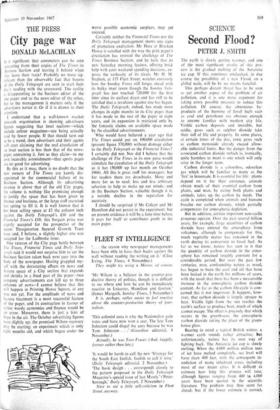City page war
THE PRESS DONALD McLACHLAN
is it significant that commuters can be seen extracting from their copies of The Times its Business Section and leaving it behind when they leave their train? Probably no more sig- nificant than the observable fact that buyers of the Daily Telegraph are seen to start their da■.*s reading with the crossword. The reality is disappointing to the business editor of the one paper and to the news editor of the other, but to the management it matters only if the advertisers notice it. Or if it is drawn to their attention.
I. understand that a well-known market research organisation is showing advertisers figures suggesting that inset sections—which include colour magazines—are being actually read by fewer people. If that should turn out to be a trend, then advertisers and their agents t‘ill start claiming that the real circulation of an inset section is less than that of the news- paper containing it. Just as they claim—to my own incurable astonishment—that sports pages are no good for advertising.
Be this as it may, there is no doubt that the new owners of The Times are keenly dis- appointed in the commercial failure of its Business Section. Although its advertising revenue is above that of the old City pages, the volume is nothing like promising enough to justify the space that has been given to finance and business, or the large staff recruited last spring to fill it. It is well known that it has been selling space at £3 the column inch against the Daily Telegraph's £10 and the Financial Times's £10; this bargain price was eagerly accepted for the prospectus of the recent Throgmorton Secured Growth Trust issue and, I believe, a slightly higher one was accepted for the Ladbroke issue.
One veteran of the City page battle between The Times, Financial Times and Daily Tele- graph said it would not surprise him to see the Business Section taken back next year into the body of the newspaper. Having grappled my- self with the devastating effects on news and feature space of a City section that expands and shrinks in a fixed part of the paper—two company advertisements can kill up to three columns of news—I cannot believe that this will happen in Printing House Square, at any rate not yet. For the amplitude of news and feature treatment is a most successful feature of the paper, and its contraction in favour of rather wordy economics and finance would be an error. Moreover, there is just a hint of hope in the air. The October advertising figures %sere slightly up; the promised Wilson recovery may be starting; an experiment which is only eight months old, and which began under the
worst possible economic auspices, may yet succeed.
Certainly neither the Financial Times nor the Daily Telegraph management shows any signs of premature exultation. Mr Hare at Bracken House is satisfied with the way the pink paper's circulation has resisted the challenge of The Times Business Section; and he feels that its new Saturday morning feature, offering brisk help with your weekend spending decisions, ex- poses the verbosity of its rivals. Mr H. M. Stephen, at 135 Fleet Street, watches enviously how the Sunday Times still forges ahead with its bulky inset (even though the Sunday Tele- graph has just touched 720,000 for the first time since its earliest days) and has still to be satisfied that a revulsion against size has begun. The Daily Telegraph, indeed, has made more changes in eight months to its City pages than it has made to the rest of the paper in eight years, and its expansion is restricted only by the fantastic claims on available space made by the classified advertisements.
Who would have believed a year ago that The Times could put on 100,000 circulation (present figure 370,000) without damage either to the Daily Telegraph or the Financial Times? I certainly did not. Nor did I believe that the challenge of The Times in its new guise would stimulate the circulation of the Daily Telegraph as it has (50,000 up last month on October 1966). All this is great stuff for managers; but for readers there are drawbacks. More and more for us to read; less and less arbitrary selection to help us make up our minds; and in the Business Section, valuable though it is, a notable decline in the reputation for accuracy.
I should be surprised if Mr Coltart and Mr Hamilton did not persist in the experiment; but on present evidence it will be a long time before it pays for itself or contributes profit to the main paper.






































 Previous page
Previous page